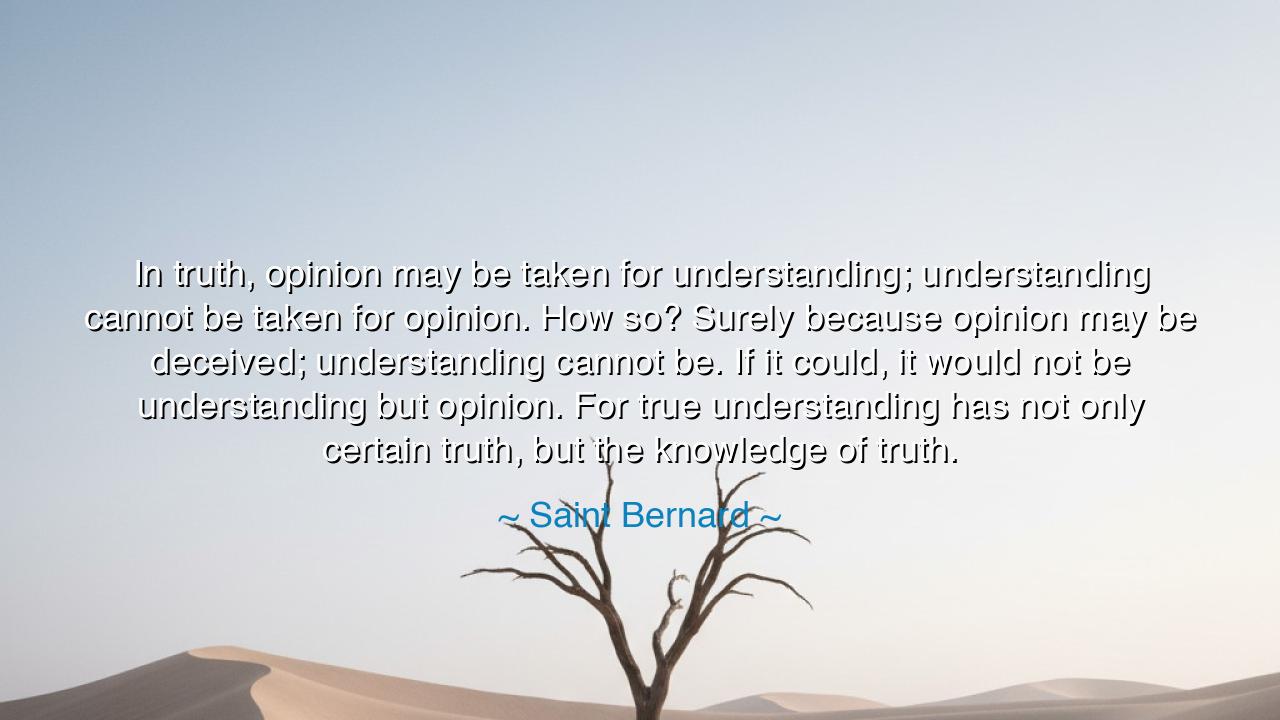
In truth, opinion may be taken for understanding; understanding
In truth, opinion may be taken for understanding; understanding cannot be taken for opinion. How so? Surely because opinion may be deceived; understanding cannot be. If it could, it would not be understanding but opinion. For true understanding has not only certain truth, but the knowledge of truth.






Saint Bernard of Clairvaux, the monk whose words lit the hearts of kings and popes, once declared with clarity that cuts like a blade: “In truth, opinion may be taken for understanding; understanding cannot be taken for opinion. How so? Surely because opinion may be deceived; understanding cannot be. If it could, it would not be understanding but opinion. For true understanding has not only certain truth, but the knowledge of truth.” In these words, Bernard divides the shallow from the deep, the fleeting from the eternal. For opinion is the shadow that dances on the wall, while understanding is the flame itself. Opinion may trick the senses, but true understanding is the union of mind and truth, inseparable and immovable.
The origin of this wisdom lies in Bernard’s devotion to both reason and faith. Living in the twelfth century, he was surrounded by debates—between philosophers and theologians, between worldly power and spiritual authority. He knew well how men clung to opinions, mistaking them for truth. Yet he also knew that truth itself, once grasped, is not fragile, not subject to change like the shifting winds of popular thought. To Bernard, understanding was not mere opinion dressed in fine words, but the certain possession of truth that illuminates the soul and cannot be shaken.
History offers us countless examples of this distinction. Consider the trial of Galileo Galilei, who proclaimed that the earth moved around the sun. His opponents, armed with centuries of opinion, sought to silence him. But Galileo possessed more than opinion—he possessed understanding, for he had joined reason with observation, and discovered truth that could not be overturned. Though condemned, he whispered, “And yet it moves.” Opinion deceived the many; understanding remained unshaken in the one who knew.
This same lesson is found in the life of Socrates, condemned for corrupting the youth of Athens. His accusers had opinions—formed by fear, tradition, and rumor. Socrates, however, lived by the search for understanding. In the end, he drank the hemlock rather than betray truth. His life testifies that opinion may deceive the multitude, but understanding, once attained, stands firm even in the face of death. For as Saint Bernard taught, if it could be deceived, it would not be understanding at all.
The meaning of Bernard’s words is therefore heroic and humbling. We must not confuse opinion with understanding, for to do so is to live in deception. Opinion is light as chaff, easily carried by the winds of persuasion, prejudice, or passion. Understanding is heavy with truth, anchored deep, unmoved by storms. To mistake the one for the other is to wander in darkness; to seek understanding is to walk in light.
The lesson for us is clear: do not be content with opinions, even your own. Test them, refine them, seek the truth beyond them. Ask yourself: “Is this merely what I think, or is it truly what is?” For opinion may be deceived, but true understanding cannot. The one who possesses understanding possesses not only truth, but the knowledge that it is truth. Such a treasure is rare, but worth all labor and sacrifice to obtain.
Practical steps follow. When confronted with a belief, ask what evidence supports it. When challenged, do not cling to opinion out of pride, but seek correction if truth demands it. Read widely, question deeply, and pray or reflect earnestly, that your soul may move from the shifting ground of opinion to the firm foundation of understanding. And when you find truth, hold it fast, for it is not fragile like opinion, but eternal, like the light of the sun.
So let Saint Bernard’s words echo through the ages: “Opinion may be deceived; understanding cannot be.” Children of tomorrow, seek not the empty comfort of mere opinion, but the unshakable fortress of understanding. For in understanding there is truth, in truth there is freedom, and in freedom there is the peace of the soul that knows it stands on eternal ground.






AAdministratorAdministrator
Welcome, honored guests. Please leave a comment, we will respond soon